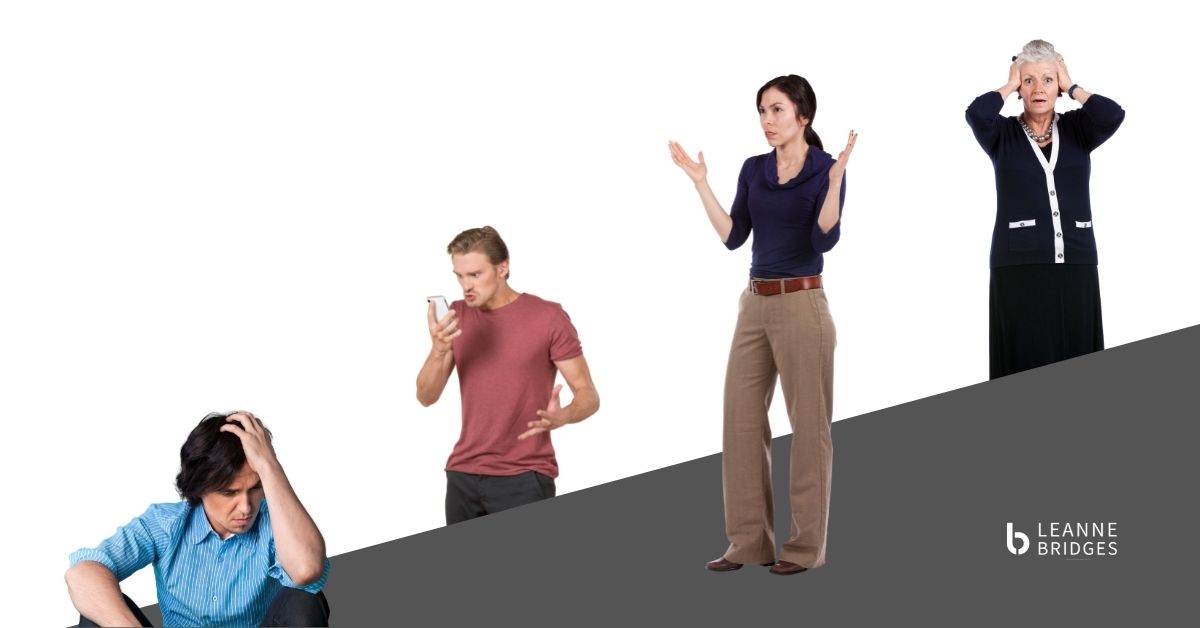Do you notice that some people can irritate you without even speaking?
Who comes to mind …?

Or you might find that you start chatting with someone and they start to get your back up, or at worst offend you.
Why does this happen?
We all have “triggers” and when our triggers are pushed by someone, they set an emotion running inside of us.
Whilst there are many reasons for this, the underlying reason is that we forget people are all so different. As we go about our daily life, we assume all people are the same as us, and that’s just not the case. We all have our own view of the world.
Everyone’s mindset and way of thinking is different because, our subconscious minds are programmed in different ways. Our subconscious holds our personality traits, memories, our values, beliefs and more.
Much of it we don’t consider and the memories are long forgotten. But it’s all there and triggers our emotions without us realising.
Once that trigger is pressed and an emotion starts to run, we can find ourselves feeling – frustrated, irritated, angry, hurt, or sad. The list is endless. Whatever the feeling, it can impact on our mood and how we respond to the other person. And, ultimately on the outcomes we get in life.
Typically, people put their emotions on the other person. Saying things like:
“She made me upset”
“He made me angry”
But, we forget that we own the emotion. No-one can make us feel anything. Our emotions are our own.
What creates these triggers?
1. Our values and beliefs
We all have a view about what’s important and an array of beliefs about ourselves, the world and life.
Let’s look at beliefs. So, as an example, some people might believe that they need to be in control of everything. If this is case, when someone else tries to take charge of a situation, a person with this belief would be triggered.
The loss of control is causing an emotion to run and their response will be to try and preserve their belief – to stay true to it. So, they’ll find themselves reacting in a way they think will mean that they’ll regain control. Perhaps they try and overbear the other person or sulk, so that they can get back in the driving seat.
This is just the tip of the iceberg, there are so many values and beliefs in play, all around us with everyone, all of the time.

2. Our personality type
We all have very different personalities and preferences and might find an individual with a different type triggers us.
Just one of our personality traits is whether we speak with inference or literally. Some people speak with hints and clues and other say it straight. In any relationship, work or home, this one can get you tied up in knots. One person hinting what they want and the other not picking up on this. Alternatively the other saying it straight out, which can feel offensive or blunt if you’ve the other preference.
3. Our memories
We retain memories of the past, sometimes without realising and they can trigger us today.
To bring this one to life, an example might be that a situation in the past has led to conflict. If that same situation (or something similar to it) arises, then we might be triggered into action to prevent a repeat of last time.
Of course, it’s rare that two situations will end the same way, so our reaction might cause a problem rather than solve it.
So, those are just a few of the things that influence us to feel and then act in a certain way.
What’s important to remember is that you own your emotions. And, you choose your response and the outcome you get.
How can you stop emotions taking over?
If you notice that you’re being triggered and you want to take back control, here are some of the ways you can do this:
- Identify what it is that you’re feeling. All emotions are different but sometimes we label them all as the same e.g. anger could be irritation, frustration or jealousy to name a few. The first step in stopping emotions taking over is to be clear on the emotion you’re feeling.
- Accept your emotion and feel it. Decide on how long you’ll sit with the emotion. If it’s intense perhaps you’ll want some time and space. But, if it’s something that’s less important and unhealthy, then you might limit yourself to a short time.
- Take a few deep breaths to regulate your system.
- Decide on the outcome you want from the situation.
- Look at the situation from the other persons perspective, what might be causing them to behave in this way.
- Apply some logic. What will logically help this situation move forward productively and to a satisfactory outcome.
Emotions really impact our lives and we fail to recognise that before our actions, there are emotions present. Emotions drive our thoughts, our actions and our results.
To master success in life then we must master our emotions.
If you want to find out more then watch my free Masterclass: 3 Secrets to Stop Sabotaging Your Own Success. Discover more about the impact of your emotions, and what you can do to take control and succeed with ease. Click here to access: Masterclass
